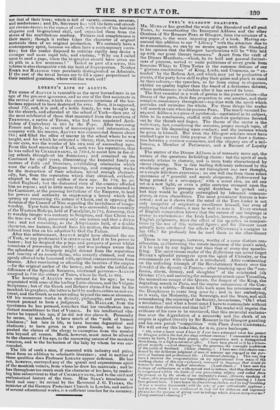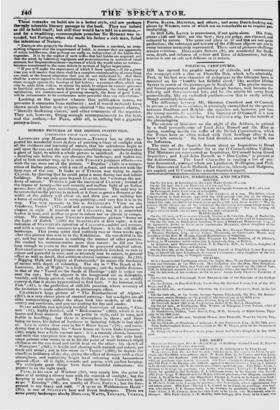PEEL'S GLASGOW ORATIONS.
MR. MURRAY has gratified the wish of the Standard and all good Tories, by transplanting the Inatusural Address and the other Orations of Sir ROBERT PEEL at Glasgow, from the columns of a newspaper, to the more imposing pages of a book. Having ex- amined this addition to our " Library " with the attention due to its rasuscitation, we can by no means agree with the Standard in his opinion that the Glasgow lueubrations will be " fitly laid up with our great literary treasures." Apart from the craft of the Dinner Manifesto,—which, by its bold and general distinct- ness of purpose, served to unite politicians of every grade from timorous Whigs to Ultra Tories in the common defence of our " glorious constitution" of King, Lords, and Commons, as " ex- tended" by the Reform Act, and which may yet be productive of events, Utile party have skill to play their game and pluck to stand by their colours,—the speeches, so far from rising to eloquence, exhibit no quality higher than the knack of a dexterous debater, whose performance is valueless after it has served its hour.
The first essential in a work of genius is the ponere totum—the fitness of the parts, their due proportion to one another, and their complete consistency throughout—together with the spirit which pervades and animates the whole. For these things the reader will search in vain when he peruses PEEL. The much -vaunted In- auguml Address is a piece of patchwork—egotistical in its subject, false in its conclusions, stuffed with stuck-in quotations ferreted out by the thumb and finger. The theme of' the orator is the well-worn, but, considering the occasion, proper enough topic, of success in life depending upon conduct ; and the instance which he gives is himself. But even the Glasgow scholars must have studied logic to very little purpose, if they cannot draw a distinc- tion between a common commoner, and the slippery son of a mil- lionaire, a Member of Parliament, and a Baronet of Loyalty Loans.
The matter of the Dinner Ad.lress is of necessity more apt, the nature of the questions forbidding choice : but the spirit of each scarcely attains to rhetoric, and is more truly characterized by clever claptrap. Nor is this leading deficiency redeemed by the excellence of parts. There is not throughout one new thought, or a single felicitous expression: no one will rise from these select specimens of " graceftil and manly eloquence, dishonoured by being printed in a newspaper," with a novel idea, an old one set in a new light, or even a pithy sentence stamped upon the memory. Clever passages might doubtless be picked out; but they would be greatly outweighed by laboured common- places, or even absurdities. The most prominent feature is bor. rowed ; and as it shows that the mind of the Tory leader is not only incapable of originating excellence himself, but even of analvzing that of others, it may be well to note it. Every student of English composition knows that the nature of our language is averse to exclamation : the Irish Leader, however, frequently, to English judgments, mars the effect of his spocclies as composi- tions by the use of' this national figure : and Sir ROBERT must actually have attributed the effects of O'CoNNELL's energies to his Ohs ! for profusely has he used them in the after-dinner address.
There is one passage, however, worthy of a more distinct con- sideration, as illustrating the innate meanness of the tuan's mind, if it be tried by any higher test than that of every-day speechi- fying. The most casual reader of the Reflections can never forget BURKE'S splendid panegyric upon the spirit of Chivalry, or the consummate art with which it is introduced. After commenting on the unfeeling triumph of the Revolutionary Society over the downfal of the dynasty of France,— after touching upon the "con- fusion, alarm, dismay, and slaughter" of the celebrated 5th October 1759, and narrating the subsequent attack upon Versailles, the miraculous escape of the Queen, the danger of the King, the degrading march to Paris, and the supine submission of the Con- vention to a rabble,—Buaus falls back upon his reminiscences of the Dauphiness in years long gone by ; and in her embodying, as it were, the Monarchy, the Sovereign, and the State, and still remembering the rejoicing of the Society, he exclaims, "Oh! what a revolution ! and what a heart must I have to contemplate without emotion that elevation and that fall !" The reader will require the evidence of his eyes to be convinced, that this mournful exclama- tion over the degradation of a tnottarcky and the shock of an empire is applied literally by Sir ROBERT to the Glasgow guzzling and his own parish "competition" with Plain JOHN CAMP/MILL. We will not say this looks like, for it is, grave burle.que.
" Oh, what a heart must I have if Icon have witnessed what has peatee in Glasgow within the lust jive days without emotion! l'imounected with this country by birth, I have been placed, niter competition with a distinguished Scotehman, in a high academical office. I have been placed in it by trium- phant majority —(loud cheering)—by the generous, the unsought confidence of the youth of Scotland. (Great Cheering.) 1 have seen their choice eon. firmed by the deliberate judgment of men of inatumr age engaged in the par. suits of business and professional life. (Continued cheering.) This very day have 1 received the congratulations on my appoiutrneut from malty of the working classes of this city—(cheers), conveyed in language that woad do honour to men if the highest education. (Loud cheers.) I have WU the fttlings of enthusiasm so witk-spread and so intense, that they disdained to be compressed within the limits of an preexisting edifice, and cacti front the ground its by the stroke of an enchanter's wand, LI3vuoti, speaking of Venice,] this magnificent and unparalleled fitbric. (Great cheering.) I have beet, present here. I have heard its founelations shaken. aid its roof frembiati was a wooden frainework] with the echo of your (nthrtsiastic applause A and do you think I can condescend to loe:k out for elaborate ind ingenious phrases for the purpose of giving vent to feeliugs which almost overpower we ? (Long-coutinueJ cheering.) " These remarks on habit are in a better style, and are perhaps theronly tolerable literary passage in the book. They are indeed as old as habit itself; but still they would have told in a sermon,— and for a twaddling, eommonplace preacher Sir ROBERT was in- tended, but Fortune, when she made his father a rich man, foiled the intentions of Nature.
" Estimate also properly the force of habit. Exercise a constant, an unre- mitting viligance over the acquirement of habit, in matters that are apparently of entire indifference, that perhaps are really so, independent of the habits they engender. It is by the neglect of such trifles that bad habits are acquired, and that the mind, by toleratiog negligence and procrastination in matters of Mall account, but frequent recurrence—matters of which the world takes no notice— becomes accustomed to the same defects in matters of higher importance.
" If you u411 make the experiment of which I have spoken,—if fur a given time you will resolve that there shall be a complete understanding of every thing you read, or the honest admission that you do not understand it ; that there shall be a strict regard to the distribution of time; that there shall be a con- stant struggle against the bondage of bad habits; a constant effort, which can only be made from within, to master the mind, to subject its various processes to healthful action,—the early fruits of this experiment, the feeling of self- satisfaction, the consciousness of growing strength, the force of good habit, will be inducements to its continuance more powerful than any exhortations."
Looking at the quarter whence this publication comes, we presume it emanates front authority ; and it would certainly have shown much better taste to have omitted "the rapturous cheers," " literally deafening cheers," and other comments of the reporter. They are, however, fitting enough accompaniments to the text, and the author,—for Pa, after all, is nothing but a gigantic penny-a-liner.



























 Previous page
Previous page